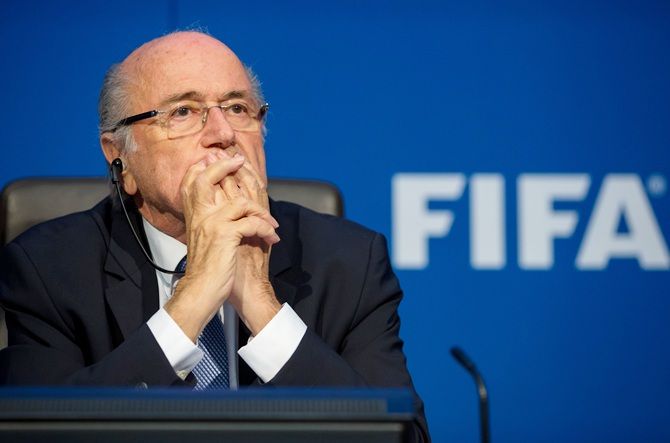
FIFA president Sepp Blatter has seven months left at the top of world soccer’s governing body but his hope of putting the organisation’s troubles behind him before he goes looks forlorn.
PHOTOS: Protester showers FIFA's Blatter with fake money
Blatter, elected to the top position in 1998, will stand down on February 26, the date FIFA selected for an ‘elective congress’ to choose his replacement.
FIFA’s answer on Monday to the corruption scandal that has engulfed it since the arrests of senior officials in May on US fraud and money laundering charges, was to announce the creation of another ‘task force’ made up of people from within the body.
The 79-year-old Blatter clearly hopes they will come up with a package of reforms that will placate his critics and those of the organisation.
"My responsibility and mission is to make sure when at the end of February I come to the end of my career, I can say in FIFA we have started again the reform and have rebuilt the reputation of FIFA," Blatter said.
But even if his task force, made up of representatives of the regional confederations but with a "neutral chairman" makes progress, it is hard to see how Blatter’s final months in charge will be anything other than fraught.
The US Department of Justice investigation into corruption, kickbacks and racketeering in soccer could lead to more charges, especially if some of those indicted agree to cooperate with authorities.
Blatter has not been charged with any wrongdoing. But former FIFA vice-president and CONCACAF president Jeffrey Webb of the Cayman Islands, widely praised by Blatter and seen as his protege, pleaded not guilty in federal court in New York on Saturday to charges of racketeering conspiracy, wire fraud and money laundering. He was released on $10 million bail.
In addition to the criminal case, the US Securities and Exchange Commission regulator was examining the behaviour of several companies with links to FIFA and other soccer organizations to see if there were possible violations of bribery laws.
Closer to FIFA's Zurich headquarters, Swiss prosecutors were looking into possible corruption around the awarding of the 2018 World Cup to Russia and the 2022 tournament to Qatar.
Earlier in July, the Swiss attorney general’s office said they have 81 reports of suspicious financial activity linked to those decisions by FIFA.
And with sponsors such as Coca Cola demanding change from FIFA and politicians such as those in the US Senate paying attention, the pressure shows no sign of easing. A Senate commerce subcommittee hearing last Wednesday questioned what US soccer chiefs knew about purported corruption in FIFA.
Former US soccer official Chuck Blazer, who was a FIFA executive committee member for 17 years, has pleaded guilty to a series of offences related to bribery and is cooperating with authorities.
Blatter surely wants to go out on a high in February, with a FIFA congress hailing his reforms.
Instead, he might find himself rather wearily handing over a lot of problems to his successor.













 © 2025
© 2025